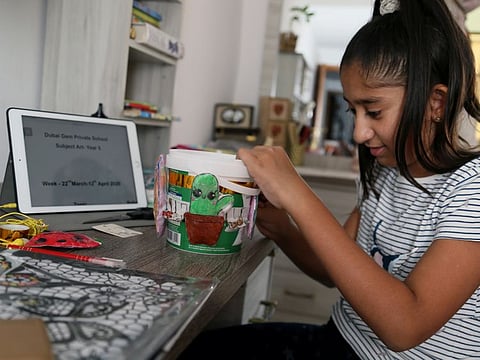Coronavirus UAE: Students persevere with online learning
Challenges include discussion-centred subjects, distractions at home and connecting

Abu Dhabi: At the end of this week, students across the UAE will have completed a month of remote learning.
Rolled out as a measure to continue education amid the coronavirus pandemic, students have coped astoundingly well with the change in teaching and learning methods, even as they continue to miss their friends and school environments.
“I don’t really have to carry my books to school, and I can complete a lot of my notes and work digitally. So this has been a change, but not too bad on the whole,” Ali Al Bastaki, 10, an Emirati Grade 5 student, told Gulf News.
“I start my lessons at 9am and finish at about 3pm, so I spend pretty much the same amount of time with my lessons,” Al Bastaki said.
After an early two-week spring break, the UAE launched remote learning on March 22 for students both in school and university. The Ministry of Education later announced that remote learning is expected to continue till the end of the current school term in June.
The classes are conducted by both public and private schools and universities using a range of software, including Class Dojo, Seesaw, iLearn, Microsoft Teams and Zoom.
In general, students say the lessons keep them occupied for a portion of the day.
“My teachers spend quite a bit of time explaining concepts during online lessons, so that is very helpful,” said Zainab Tanvir Ahmed, 14, a grade 9 student at an Indian curriculum school.
Yet, there are unavoidable challenges. Students have reported facing difficulties connecting online at the same time, and

Each lesson lasts about an hour each, but Ahmed also has to dedicate additional time to finish related work. Then there are the distractions of studying at home, which makes the whole process longer.
Al Bastaki added that he misses his classmates a lot.
“Classes are definitely less fun, because I cannot discuss the lessons with me friends. This is more obvious in lessons where we need to discuss the material more, like Arabic. So online school is not bad, I cannot wait to go back to a real school,” he said.

“For example, it isn’t hard to discuss Economics tables and data with my professor for my thesis research. But when we have a discussion-based lesson for the Applied Ethics course I am taking, it is more challenging. One cannot read others’ body language and respond accordingly, and so it takes longer to explain things and respond to them,” the 22-year-old Greek-Singaporean student said.
While they are prepared to continue learning remotely for the moment, it remains clear that children cannot wait to return to school.






